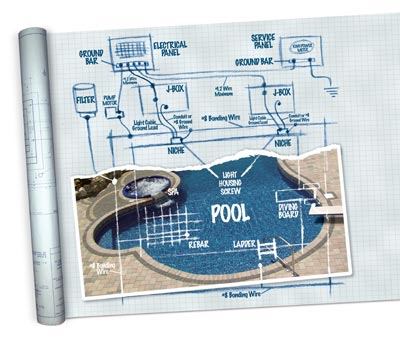Code officials have rejected the latest attempt to require full copper wire grids beneath certain pool and spa decking and perimeter surfaces.
In early August, panelists from the National Fire Prevention Association considered arguments for and against the proposal to mandate the grids, which would exceed the current requirements of a No. 8 single wire for select perimeter bonding applications.
Proponents have repeatedly argued that the single wire is insufficient to protect against stray currents beneath pavers, grass and fibercrete surfaces.
But members of the panel voted overwhelmingly against them.
“Their argument may have been stated in a different fashion, but there was no additional rationale given for why the single wire isn’t adequate,” said Lee West, the Association of Pool & Spa Professionals’ representative on the NFPA’s code-making panel that covers the pool and spa section of the NEC.
The group pushing for the welded copper wire grid is composed of an electrical inspector, a number of utility companies and at least one manufacturer. They’ve asked the panel on multiple occasions to incorporate the grid requirement into the 2011 NEC since it was dropped for the 2008 version years ago. The NEC follows a three-year cycle for revisions.
To back their claim, the group references a 2007 study by the National Electric Energy Testing, Research & Applications Center. The NEETRAC report found that “the single conductor application may not provide adequate protection that a copper grid provides.” It also cited shock incidents in Georgia and Mississippi.
The study was commissioned by Dominion, one of the nation’s largest energy suppliers headquartered in Richmond, Va.
But industry advocates and code officials have questioned the validity of NEETRAC’s conclusions since its release. Among other points of contention is the fact that it only addressed a single pool — and a single pool type — in Georgia.
What’s more, they say, nowhere in the study is it proven that the single-wire approach results in unsafe voltage levels.
“If this comes up again — and we suspect it will — we agreed to form a task group to study whether there are incidents in the field we should be concerned about,” added West, who also is technical manager at Newport Controls in Irvine, Calif. “But the most we’ve heard so far is a tingle, and that’s not reason enough for a grid.”
West also noted that the NEC establishes minimum national requirements, and that local jurisdictions are free to establish more stringent codes or guidelines.
But for those opposed to the grid requirement, the NFPA’s ruling was met with a measure of relief.
“Any panel that considers these types of appeals realizes what is necessary to protect the consumer,” said Lawrence Caniglia, executive director of the Northeast Spa & Pool Association in Hamilton, N.J., who submitted a written argument against the appeal. “So this is great news because it’s recognizing that there are other alternatives to addressing stray voltage.”




